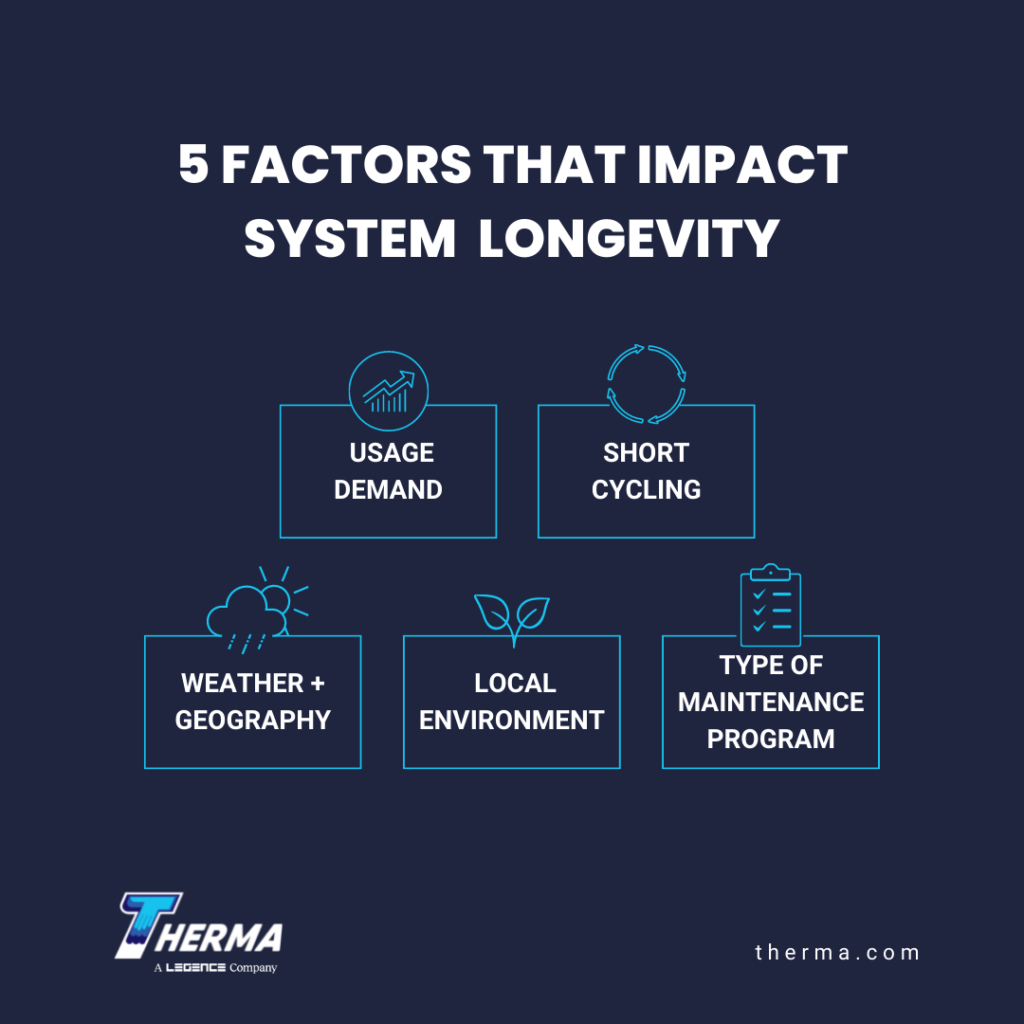by Patti Dees
How long an air conditioner (AC) lasts is as important as how much it costs. Knowing the average lifespan of an AC unit, and how to maximize its longevity, is essential for planning and maintenance. The cost of installing or upgrading HVAC equipment must be balanced against how long the equipment is expected to be in service.
Types of Air Conditioners and Their Average Lifespan
Commercial HVAC designs vary as each building’s heating and cooling needs are different. There are several types of AC equipment available:
- Central AC units: A single compressor services an entire area or building. Useful for large buildings.
- Split AC units: System consists of multiple parts: an outdoor unit and indoor unit that work together to manage temperature and ventilation. Can be single or multiple splits.
- Window or wall mounted units: Used for single room cooling.
- Packaged units: All parts needed for heating, cooling, and ventilation are contained in a single casing or box. Usually placed outside.
According to the American Society of Heating, Refrigerating and Air-Conditioning Engineers (ASHRAE) Equipment Life Expectancy chart, the median lifespan of air conditioning units is 15 years. The only exception is the window-mounted unit, which has a median life expectancy of 10 years. However, there are several factors which can impact where a unit’s usefulness falls compared to the median.
 5 Factors That Impact Longevity
5 Factors That Impact Longevity
Even under the best circumstances, an AC unit will eventually fail. The factors that affect equipment deterioration include:
1. Usage Demand
HVAC units are designed to meet an estimated usage demand based on the size of the building, the number of occupants and the types of activities within it. Equipment that is used outside that range can experience different fatigue rates than expected.
2. Short Cycling
Short cycling (frequent turning off and on) is a sign that an HVAC system is under strain. It can be caused by improper sizing of the unit, limited air flow or electrical issues. The increased frequency of the unit’s on/off cycle speeds up the rate of fatigue on the equipment, shortening its lifespan.
3. Exposure to Weather and Geography
Even if a type of unit is expected to be placed outdoors, environmental conditions can shorten the life of the unit. Humidity, exposure to frequent extreme temperature shifts, and storm frequency can damage the materials or increase the rate of deterioration.
4. Local Environment
Units located in cleaner environments tend to last longer than those exposed to excessive dust, grime, humidity, contaminants or moisture. Corrosion and rust contribute to equipment failure. Medical environments may also place additional strain on units if additional cycling or unsupported filtration is used.
5. Type of Maintenance Program
Run-to-failure maintenance styles increase the risk of serious equipment failures which will shorten the lifespan of any equipment, not just HVAC units.
Getting the Most Out of Your Equipment
Some of the factors that impact equipment longevity, such as geography, are outside of a building owner’s control. However, there are several factors that can improve a system’s odds of reaching or exceeding the median expected lifespan.
- HVAC Preventative Maintenance: Check off the items on this preventive maintenance checklist. It cannot be stressed enough: take care of your AC units and they will last a lot longer.
- Properly Sized Equipment: Similarly, ensuring that the unit is sized properly and designed with current use and occupancy rates in mind can also help extend the unit’s usefulness. Remodeling or significant increases in the number of people using certain spaces can throw off air distribution and heat loads, causing a building’s AC to struggle.
- Monitor Building Systems: Periodically assessing the state of a building’s system and making necessary adjustments to maintain efficiency keeps the AC in good shape for as long as possible.
A healthy AC unit can cut operation costs and ensure your equipment lasts, improving its ROI. Therma’s HVAC professionals can suggest methods beyond preventive maintenance and support a proactive attitude towards efficiency to extend the life of your AC. They have extensive experience in HVAC design and maintenance for a variety of industries. Connect with Therma’s HVAC team.
 Patti draws on her background as a chemical engineer to share information with readers on technology, manufacturing, and construction.
Patti draws on her background as a chemical engineer to share information with readers on technology, manufacturing, and construction.
Sources and Additional Reading
Bright Hub Engineering – Types of Air Conditioning Systems: Window, Split, Packaged and Central
Cleaning Services Group, Inc – Commercial building hvac systems: everything you wanted to know
HVAC/R and Solar energy – HVACR Equipment Life Expectancy
Consulting Specifying Engineer – How pandemics affect HVAC in building design







